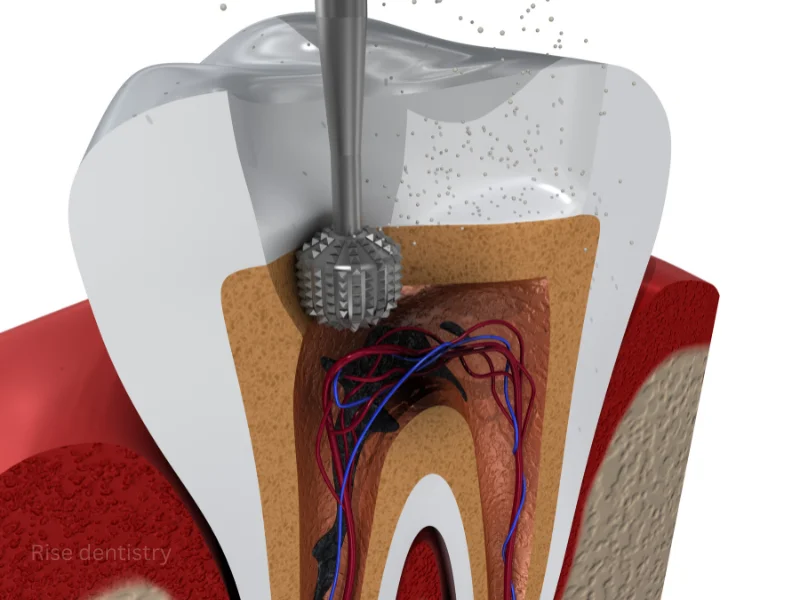
Root canals are usually quick and effective, often completed in a single visit. Learn what to expect and schedule your treatment today!
If you’ve been wondering how long do root canals take, the answer depends on your tooth type and how complex the case is. This routine dental procedure saves your natural tooth from decay or infection while easing pain and restoring comfort.
In most cases, the treatment is completed in a single appointment, usually within 30 to 90 minutes. However, some teeth—especially molars with multiple canals—may take longer or need an additional visit.
Knowing what to expect during the process can reduce anxiety and make your experience smoother. In this guide, we’ll explain the complete timeline, root canal procedure time, and recovery process so you can feel confident about your dental care.

This common dental procedure is done to save a severely damaged or infected tooth. It becomes necessary when bacteria reach the inner layer, called the dental pulp, causing pain or swelling. Without proper care, the infection can spread and lead to serious problems.
During treatment, your dentist removes the infected tissue, cleans the root canal system, and seals it to prevent future infection. This process stops bacteria from spreading and preserves your natural tooth.
To ensure comfort, local anesthesia is used so you remain relaxed and pain-free throughout the procedure. The main goal is to relieve tooth pain while keeping your smile healthy and natural.

The average time for this treatment depends on your tooth type and the infection’s severity. In most cases, it takes about 30 to 90 minutes. Your dentist will determine the exact procedure time and the overall root canal length of time after examining your tooth.
Front teeth like incisors and canines are quicker to treat and often finished in 30 to 60 minutes. Premolars may take longer because they can have one or two canals, while molars at the back can require up to 90 minutes due to multiple canals.
Many cases are completed in a single visit, but some may need another appointment. Whether simple or complex, every treatment aims to save your natural tooth and relieve pain effectively.
The time for front teeth is usually shorter. Canines and incisors have one canal, making them easier to treat. The duration for these teeth typically ranges between 30 and 60 minutes, allowing for a smoother procedure.
Premolars sit between front and back teeth and may have one or two roots. Cleaning and shaping their canal system takes longer. On average, treatment for premolars takes 60 to 90 minutes, depending on root complexity.
Molars are larger and have the most complex structure. They usually contain multiple canals that require extra care. Because of this, treatment for molars often takes 90 minutes or more to ensure every canal is properly cleaned and sealed.
A root canal treatment follows clear steps of root canal treatment procedure designed to save your natural tooth and stop pain effectively. Understanding the root canal steps makes the process easier and less stressful.
Your dentist examines the tooth and takes an X-ray to locate infection inside the canal system.
Local anesthesia keeps you comfortable, while a rubber dam keeps the tooth dry during the procedure.
The damaged tissue is removed, and the canals are cleaned, disinfected, and shaped carefully to remove bacteria.
Once cleaned, the canals are filled and sealed to prevent reinfection and strengthen the tooth.
A crown is placed to protect and restore function. Proper sterilization ensures safe and lasting results.
Treatment time varies by patient. Several factors affect how long the procedure takes:

Severity of infection: Mild infections can often be completed in one visit, while deeper infections take longer.

Tooth type and canal complexity: Front teeth are simpler, while molars with multiple canals increase the average treatment time.

Multiple appointments: Some cases need extra visits to ensure the canal system is fully cleaned and sealed.

Dentist’s expertise and technology: Skilled Family Dentistry professionals using advanced tools can reduce overall duration.

Patient comfort and anesthesia: Sensitivity or slow numbing may slightly extend time.

Previous dental work: Crowns or old fillings can make access more complex.
Modern dental methods now make most procedures faster, safer, and more comfortable.

After treatment, healing is usually quick. The root canal recovery time typically lasts a few days, and mild sensitivity fades soon. Proper after care protects your natural tooth and prevents infection.

Avoid chewing hard foods: Skip hard or sticky items until your dentist places a crown for protection.

Maintain oral hygiene: Brush gently and rinse with warm salt water as part of your after care routine.

Follow up with your dentist: Regular visits ensure the dental procedure heals correctly.

Manage discomfort: Mild soreness is normal and can be eased with pain relievers.

Eat soft foods: Choose soups, yogurt, and mashed foods for a few days.

With the right root canal after care and support from your Family Dentistry provider, your Root Canal Treatment will heal properly and last for years.
This therapy usually takes 30 to 90 minutes and can often be done in a single visit. It removes infection, cleans canals, and restores your natural tooth, helping you avoid long recovery periods.
Tooth removal may seem faster, but full replacement takes longer. After extraction, you’ll need healing before placing an implant or bridge, which can take weeks or months. These extra steps increase both time and cost.
In most cases, saving your natural tooth through treatment is quicker and more efficient than extraction and replacement. It avoids extended visits and maintains long-term oral health. Most dentists recommend preserving the tooth whenever possible.
The procedure isn’t painful. Local anesthesia keeps you comfortable, and mild soreness afterward fades in a few days.
Deep decay, trauma, or infection in the dental pulp may require treatment and can increase the time needed.
Most dentists complete it within 30 to 90 minutes per appointment, depending on tooth type and complexity.
Costs vary by tooth location. Molars cost more due to multiple canals and longer procedure time.
With modern dental procedures, pain is minimal—typically 1 to 3 on a scale, similar to a filling.

This safe and routine dental procedure saves your natural tooth from decay or infection with a short recovery time.
Choosing therapy over extraction keeps your smile natural, preserves your bite, and avoids costly implants or bridges. It’s one of the best ways to protect your oral health.
At Rise Dentistry, our skilled Family Dentistry team ensures every treatment is gentle, precise, and comfortable. Book your appointment today and let our experts restore your smile with confidence.

EXCELLENTTrustindex verifies that the original source of the review is Google. "For years, I avoided the dentist due to my anxiety. Dr. Hassan sorathia and their team completely changed my perspective. The office has such a calming atmosphere, and the staff is compassionate and understanding. They explained every step of my treatment and made sure I was comfortable. I'm so grateful I found them and can now take care of my teeth without fear."Posted onTrustindex verifies that the original source of the review is Google. Rise was amazing! They extracted a wisdom tooth from me and the experience was completely pain free. Thank you so much!Posted onTrustindex verifies that the original source of the review is Google. I’m so grateful I found Dr. Sorathia and his wonderful staff at Rise Dentistry! From the moment I called, his office was incredibly accommodating and got me in immediately. He was professional, kind, and patient, and he truly understood my dental anxiety. I never felt rushed or pressured and he welcomed all my questions and explained each step of the process so I always knew what was happening. He made sure I understood all of my options, allowing me to make the most informed decision for my care. I left feeling comfortable, informed, and confident about my treatment. I will absolutely be returning to Dr. Sorathia and highly recommend him to anyone looking for a compassionate and thorough dentist.Posted onTrustindex verifies that the original source of the review is Google. I’m so glad I found this office! Staff is so kind and professional. They keep your comfort at the top of their priority list. Wish I had found them sooner! Can’t recommend this dentist enough!Posted onTrustindex verifies that the original source of the review is Google. Excellent Staff and Dr Sorathia very knowledgeable pleasant ambiance !Posted onTrustindex verifies that the original source of the review is Google. Had a great experience, no wait time, in and out. Everyone was friendly, informative and professional.Posted onTrustindex verifies that the original source of the review is Google. So refreshing to meet an HONEST dentist who isn’t trying to upsell you anything. Just tells you the facts doesn’t try to sway your opinion, just lays out the options based on facts and allows you to choose for yourself what works best for you. I definitely highly recommend!Posted onTrustindex verifies that the original source of the review is Google. Fantastic service! Had a bad tooth that was absolutely killing me for several days. I load going to the dentist so I don’t have a normal one. Set the appointment in the morning and got in that same day. The dentist explained saving versus extracting the tooth and 35 minutes later I was going home. He was extremely thorough and telling me what he was going to do and with the post office instructions. The staff both out front and his assistants were fantastic!! absolutely could not have asked for a better experience and he will be my dentist going forward.
© 2023-2025 Rise Dentistry. All rights reserved.